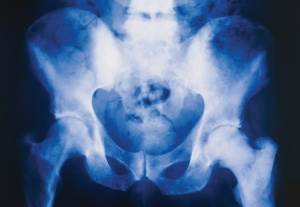|
|
Intensive Local Therapy to RCC Bone Metastases May Increase Survival - Renal and Urology News |
May 18, 2015

The approach was defined as surgical resection with a wide margin or radiotherapy with a biologically effective dose of 140 Gy or greater.
NEW ORLEANS—Intensive local therapy to bone lesions in patients with renal cell carcinoma (RCC) with bone metastases may improve survival, data presented at the 2015 American Urological Association annual meeting.
The data are from a retrospective Japanese study of 70 RCC patients with bone metastases (BM). Of these, 27 (39%) had multiple BM. BM sites included the vertebra (38 patients), pelvis (18 patients), long bones (21 patients), and other sites (23 patients).
For the study, Hiroshi Fukushima, MD, and colleagues at Tokyo Metropolitan Cancer and Infectious Diseases Center, defined intensive local therapy as surgical resection with a wide margin or radiotherapy with a biologically effective dose of 140 Gy or greater to BM. The investigators classified patients into 3 groups: intensive local therapy to BM with curative intent to the other lesions (level 1, 19 patients); intensive local therapy to BM without curative intent to the other lesions (level 2, 15 patients); and less intensive or no local therapy (level 3, 36 patients).
During a median follow-up of 13 months, 37 patients (53%) died. The median overall survival rate was 22 months. Patients in level 1, 2, and 3 had 1-year overall survival rates of 84%, 70%, and 51%, respectively. On multivariate analysis, intensive local therapy to BM independently predicted a significant 55% decreased risk of death compared with less intensive or no local therapy.
|
|
|
Metastasectomy May Up Survival in Metastatic RCC Patients - Renal and Urology News |
May 18, 2015

In a study, patients who had the procedure had a better 5-year overall survival rate than those who did not (68% vs. 27%).
NEW ORLEANS—Two studies presented at the 2015 American Urological Association annual meeting suggest that complete metastasectomy may have a role in improving survival among patients with metastatic renal cell carcinoma (mRCC).
In a retrospective study of 119 patients who underwent radical nephrectomy and were diagnosed with metastatic disease, Japanese researchers found that the 55 patients treated with metastasectomy had a significantly better 5-year overall survival rate compared with the 64 patients who did not (68% vs. 27%).
Of the 119 patients, 48 (40%) had lung-only metastases and 71 (60%) had metastases at sites other than the lung. For both groups, the overall 5-year survival rate was significantly better among those who underwent metastasectomy than those who did not (82.3% vs. 51.4% for those with lung-only metastases and 57.4% vs. 71.% for those with non-lung-only metastases).
Of the 55 patients who underwent metastasectomy, 9 (16%) had incomplete metastasectomy whereby all lesions were not resected. The estimated 5-year cancer-specific survival rate of these patients was lower than those who had complete resection (68.6% vs. 78.2%), but higher than patients who did not undergo metastasectomy (28.5%), the researchers reported.
In multivariate analysis, complete metastasectomy was independently associated with a significant 69% decreased risk of death.
In the other study, South Korean investigators reviewed the medical records of 323 mRCC patients who received no systemic treatment. Of these, 13 underwent complete metastasectomy followed by targeted therapy, 48 underwent partial metastasectomy followed by targeted therapy, and 262 received targeted therapy only. The median overall survival was 70.9, 29.9, and 19.4 months in the complete, partial, and non-metastasectomy groups, respectively. On multivariate analysis, complete metastasectomy was associated with a significant 70% decreased risk of death.
The investigators concluded that aggressive metastasectomy should be considered in mRCC patients if the metastases are surgically resectable.
|
|
Metastasectomy May Raise Survival in Metastatic Renal Cell Carcinoma - Cancer Therapy Advisor |
May 18, 2015

Complete metastasectomy may have a role in improving survival among patients with mRCC.
NEW ORLEANS—Two studies presented at the 2015 American Urological Association annual meeting suggest that complete metastasectomy may have a role in improving survival among patients with metastatic renal cell carcinoma (mRCC).
In a retrospective study of 119 patients who underwent radical nephrectomy and were diagnosed with metastatic disease, Japanese researchers found that the 55 patients treated with metastasectomy had a significantly better 5-year overall survival rate compared with the 64 patients who did not (68% vs. 27%).
Of the 119 patients, 48 (40%) had lung-only metastases and 71 (60%) had metastases at sites other than the lung.
For both groups, the overall 5-year survival rate was significantly better among those who underwent metastasectomy than those who did not (82.3% vs. 51.4% for those with lung-only metastases and 57.4% vs. 71.% for those with non-lung-only metastases).
Of the 55 patients who underwent metastasectomy, 9 (16%) had incomplete metastasectomy whereby all lesions were not resected.
The estimated 5-year cancer-specific survival rate of these patients was lower than those who had complete resection (68.6% vs. 78.2%), but higher than patients who did not undergo metastasectomy (28.5%), the researchers reported.
In multivariate analysis, complete metastasectomy was independently associated with a significant 69% decreased risk of death.
In the other study, South Korean investigators reviewed the medical records of 323 mRCC patients who received no systemic treatment.
RELATED: Socioeconomic Predictors of Clear-Cell Renal Cell Carcinoma Identified
Of these, 13 underwent complete metastasectomy followed by targeted therapy, 48 underwent partial metastasectomy followed by targeted therapy, and 262 received targeted therapy only.
The median overall survival was 70.9, 29.9, and 19.4 months in the complete, partial, and non-metastasectomy groups, respectively. On multivariate analysis, complete metastasectomy was associated with a significant 70% decreased risk of death.
The investigators concluded that aggressive metastasectomy should be considered in mRCC patients if the metastases are surgically resectable.
|
|
Larger RCC Tumors Predict High-Grade Pathology - Renal and Urology News |
May 18, 2015

In multivariate analysis, larger tumor size was associated with a significant 62% increased odds of high-grade pathology.
NEW ORLEANS—Larger tumor size is associated with high-grade pathology in patients with pT1a renal cell carcinoma (RCC), according to study findings presented at the 2015 American Urological Association annual meeting.
Jeffrey A. Larson, MD, of the Washington University School of Medicine in St. Louis, Mo., and colleagues identified 975 patients with T1a N0M0 RCC treated with robotic-assisted partial nephrectomy. The clinical tumor size was 2.84 cm in patients with high-grade pathology and 2.56 cm in patients with low-grade pathology, a size difference that was statistically significant, the researchers reported. In multivariate analysis, larger tumor size was associated with a significant 62% increased odds of high-grade pathology.
The study also found that male patients had a significant 66% increased odds of high-grade pathology compared with female patients and papillary RCC was associated with a significant 73% increased odds of high-grade pathology compared with clear-cell RCC.
The authors noted that, with an increased focus on the use of renal mass biopsies and surveillance of small renal masses (SRMs), the confirmation of the size to grade correlation of pT1a RCC allows urologists to predict more accurately which SRMs are appropriate to treat and which might be safely surveyed.
|
|
Larger Renal Cell Carcinoma Tumors Predict High-Grade Pathology - Cancer Therapy Advisor |
May 18, 2015

Larger tumor size is associated with high-grade pathology in patients with pT1a renal cell carcinoma.
NEW ORLEANS—Larger tumor size is associated with high-grade pathology in patients with pT1a renal cell carcinoma (RCC), according to study findings presented at the 2015 American Urological Association annual meeting.
Jeffrey A. Larson, MD, of the Washington University School of Medicine in St. Louis, Mo., and colleagues identified 975 patients with T1a N0M0 RCC treated with robotic-assisted partial nephrectomy.
The clinical tumor size was 2.84 cm in patients with high-grade pathology and 2.56 cm in patients with low-grade pathology, a size difference that was statistically significant, the researchers reported.
In multivariate analysis, larger tumor size was associated with a significant 62% increased odds of high-grade pathology.
RELATED: Intensive Local Therapy to Renal Cell Carcinoma Bone Metastases May Increase Survival
The study also found that male patients had a significant 66% increased odds of high-grade pathology compared with female patients and papillary RCC was associated with a significant 73% increased odds of high-grade pathology compared with clear-cell RCC.
The authors noted that, with an increased focus on the use of renal mass biopsies and surveillance of small renal masses (SRMs), the confirmation of the size to grade correlation of pT1a RCC allows urologists to predict more accurately which SRMs are appropriate to treat and which might be safely surveyed.
|
|
|
|
|
<< Start < Prev 121 122 123 124 125 126 127 128 129 130 Next > End >>
|
|
Page 126 of 2630 |
 Log in to explore the world's most comprehensive database of dialysis centres for free!
Log in to explore the world's most comprehensive database of dialysis centres for free!  Professional dialysis recruitment
Professional dialysis recruitment





